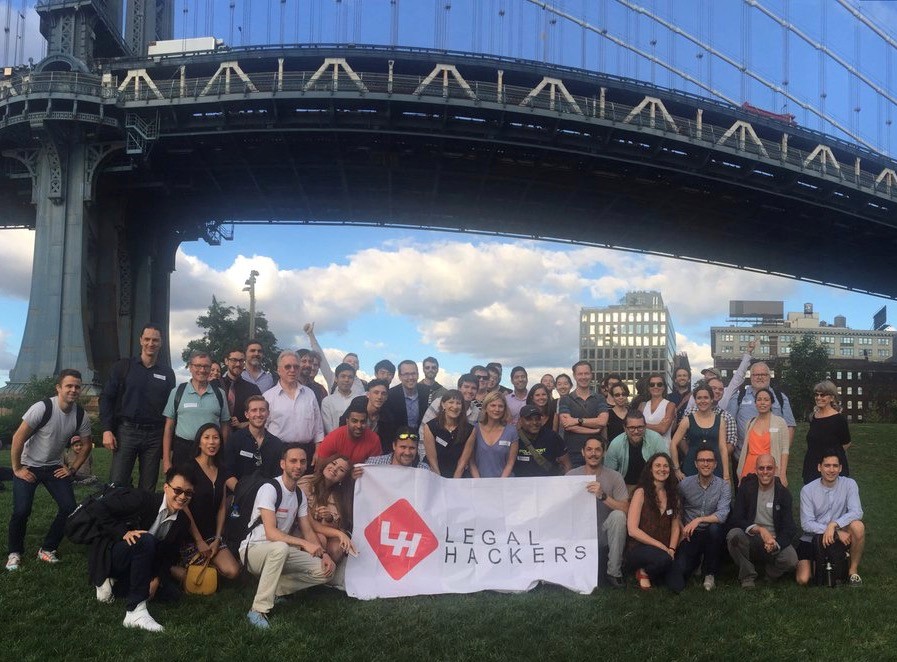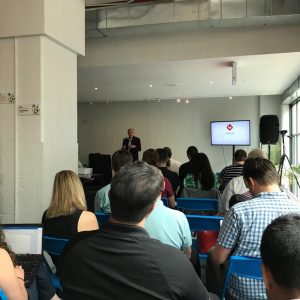
The Legal Hackers International Summit in Brooklyn featured lawyers, professors, coders and entrepreneurs from the U.S., Nigeria, Ukraine, Dubai, Canada and more ― all focused on the common theme of making law more accessible and efficient through technology. 2L Nate Crosser, third from left on the front row, attended on behalf of the Kauffman Foundation.
After a respite from the pressures of “Fun-L” year (in the form of a trip to Europe), I dove right into two jobs this summer. I had no idea what to do with my life, so I decided to hedge my bets and work in two totally different sectors. I didn’t expect that the two together would serendipitously give me clarity and purpose. I want to do whatever I can to make the law more accessible and efficient through the entrepreneurial process.
I spent the first half of my summer working for the chief judge of the U.S. District Bankruptcy Court, District of Kansas in Topeka and the latter half at the Kauffman Foundation in Kansas City.
My biggest takeaways from my judicial field placement were that the law does not work the same for everyone, and in most instances, justice is extremely slow and expensive. Even in the bankruptcy system ― where people are there literally because they don’t have enough money ― it seems to be a practical necessity to hire an attorney. Once a case has been opened, hours and hours of attorney, court and trustee time are devoted to tracking and arguing over the debtor’s payment progress. I spotted a problem.
At the Kauffman Foundation (a large non-profit), I worked in the entrepreneurship department, where our goal was to create systems to support entrepreneurs across the country. An entrepreneur is someone who sees problem as opportunity, then has the courage, ingenuity and grit to pursue a novel solution.
A few months ago, thanks to the Kauffman Foundation, I got to attend the Legal Hackers International Summit in Brooklyn ― a gathering designed to improve the field of law through technology and entrepreneurship. It was a surreal experience, where I got to work with thought (and action) leaders from around the globe.

Jim Sandman, Legal Services Corporation president, speaks at the Legal Hackers International Summit.
Our first speaker was Jim Sandman, president of Legal Services Corporation, the largest funder of low-income civil legal aid in the U.S. He stressed the myopia of the field of law ― it is designed by lawyers, for lawyers, to perpetuate lawyering ― despite the fact that in 70 percent of state civil cases, at least one party is “pro se” (without an attorney), and as high as 90 percent in eviction cases. This wouldn’t be a problem if our system were more user friendly, but it’s not. Mr. Sandman summed up the problem with an anecdote about a sign in a courtroom that read “pro se litigants here” ― as if they were supposed to know what that means.
The rest of the summit was devoted to innovators providing their solutions to tackle problems in the law: using data science and network theory to improve prosecution of human traffickers, using the blockchain to enable self-sovereign personal identification, creating transparent systems to fight corruption and bureaucracy in the Middle East and Nigeria, and more.
I could say a lot more, but this is already too long. Suffice to say, I took a couple seemingly random internships this summer, and it has changed the rest of my life! I suppose the takeaway for my classmates reading this is go ahead and do that weird thing you aren’t sure will help your career. It could be the most important thing you do.
― Nate Crosser is a 2L and KU Law Student Ambassador from Lenexa.